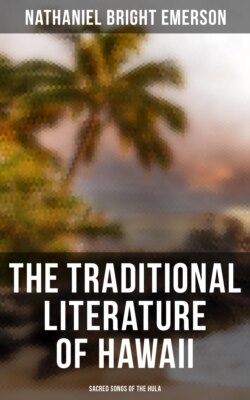Читать книгу The Traditional Literature of Hawaii - Sacred Songs of the Hula - Nathaniel Bright Emerson - Страница 14
На сайте Литреса книга снята с продажи.
RULES OF CONDUCT AND TABUS
ОглавлениеWithout a body of rules, a strict penal code, and a firm hand to hold in check the hot bloods of both sexes, it would have been impossible to keep order and to accomplish the business purpose of the organization. The explosive force of passion would have made the gathering a signal for the breaking loose of pandemonium. That it did not always so result is a compliment alike to the self-restraint of the people and to the sway that artistic ideals held over their minds, but, above all, to a peculiar system of discipline wisely adapted to the necessities of human nature. It does not seem likely that a Thespian band of our own race would have held their passions under equal check if surrounded by the same temptations and given the same opportunities as these Polynesians. It may well be doubted if the bare authority of the kumu would have sufficed to maintain discipline and to keep order, had it not been reenforced by the dread powers of the spirit world in the shape of the tabu.
The awful grasp of this law; this repressive force, the tabu, held fast the student from the moment of his entrance into the halau. It denied this pleasure, shut off that innocent indulgence, curtailed liberty in this direction and in that. The tabu waved before his imagination like a flaming sword, barring approach to the Eden of his strongest propensity.
The rules and discipline of the halau, the school for the hula, from our point of view, were a mixture of shrewd common sense and whimsical superstition. Under the head of tabus certain articles of food were denied; for instance, the sugar-cane--ko--was forbidden. The reason assigned was that if one indulged in it his work as a practitioner would amount to nothing; in the language of the kumu, aohe e leo ana kana mau hana, his work will be a failure. The argument turned on the double meaning of the word ko, the first meaning being sugar cane, the second, accomplishment. The Hawaiians were much impressed by such whimsical nominalisms. Yet there is a backing of good sense to the rule. Anyone who has chewed the sweet stalk can testify that for some time thereafter his voice is rough, ill-fitted for singing or elocution.
The strictest propriety and decorum were exacted of the pupils; there must be no license whatever. Even married people during the weeks preceding graduation must observe abstinence toward their partners. The whole power of one's being must be devoted to the pursuit of art.
The rules demanded also the most punctilious personal cleanliness. Above all things, one must avoid contact with a corpse. Such defilement barred one from entrance to the halau until ceremonial cleansing had been performed. The offender must bathe in the ocean; the kumu then aspersed him with holy water, uttered a prayer, ordered a penalty, an offering to the kuahu, and declared the offender clean. This done, he was again received into fellowship at the halau.
The ordinary penalty for a breach of ceremony or an offense against sexual morality was the offering of a baked porkling with awa. Since the introduction of money the penalty has generally been reckoned on a commercial basis; a money fine is imposed. The offering of pork and awa is retained as a concession to tradition.
